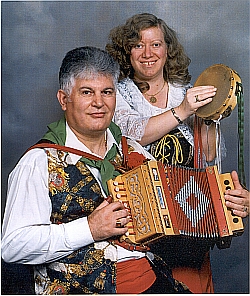Roberto & Rosanna de Sanctis

Victoria, Australia
Roberto De Sanctis was born in Guardiagrele (Chieti) Abruzzo, Italy.
He has been working in the field of music with an impressive curriculum of studies and achievements in the areas of musical research, composition and performance.
Roberto has worked as a musician, singer,composer, teacher and author of manuals for a variety of instruments.
Before arriving in Australia on his honeymoon in 1979 with his wife, Rosanna Luciana De Sanctis, psychologist and linguist,
Roberto had already achieved a rewarding musical career in Italy and Europe. He played in famous orchestras in a number of exclusive hotels, night clubs, cabarets and casinos such as San Remo, Saint Vmcent, Venezia, Campione D'Italia, Kursal (Switzerland and Montecarlo.
In Australia, Roberto has continued his musical career by participating in concerts and festivals.
He has performed in venues and events such as:
Le Meridien, Hilton on the Park, The Park Hyatt,The Australian Tennis Open,
The Formula One Grand Prix Melbourne, The Melbourne Cup,Chateau Yering, Colonial Stadium,
Globe to Globe Festival, Lygon St. Festa, Crown Casino, Victorian Arts Centre, St. Patrick's Cathedral etc.
Furthermore, in Australia Roberto has focused on recapturing and maintaining traditional Italian folkloric music which has slowly lost its dynamic presence in Italian culture.
He has dedicated time and effort to the study of the diatonic accordion and has successfully brought about
a revival in the study and performance of this traditional instrument.
Roberto has composed many pieces for the diatonic accordion and has succeeded in reaching top world sales
with his C.D. "Ddu Botte Dance Hits" and cassette "Eviva L' Allegria con Roberto and Rosanna De Sanctis".
He is the author of the text "The Diatonic Accordion by Roberto De Sanctis".
He plays the Diatonic Accordion in a revolutionary style which is unique and technically virtuosic.
He has been credited with the title "King of the Diatonic Accordion " in so far as he has bestowed dignity and nobility upon an instrument which throughout history has, on several occasions, risked extinction from Italian tradition and culture.















